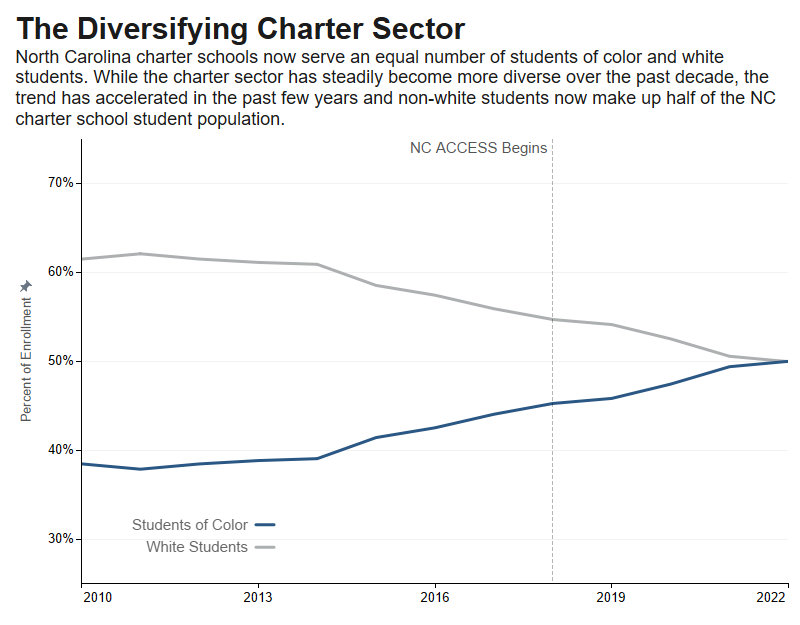The 2022 Annual Review is here!
Read about the progress the NC ACCESS Program and its subgrantees have made over the last year.
Program Impact
There are numerous factors creating barriers that prevent every student from obtaining the same educational opportunities and outcomes. Solutions to those challenges cannot ignore issues of race, class, language proficiency, disability, and other factors. The NC ACCESS Program is striving to remove barriers to any student wishing to attend a North Carolina charter school and better support educationally disadvantaged students in charters. Learn more about the specific actions the program is taking.
The goals of the program include:
Awarding 60 school-level subgrants to increase the number of educationally disadvantaged students attending high-quality charter schools;
Creating a cohort of 160 charter school leaders who can develop and demonstrate best practices in serving educationally disadvantaged students; and
Broadly disseminating best practices in serving educationally disadvantaged students and fostering collaboration in the charter school community and between charter schools and traditional public schools.
The NC ACCESS Program is just one aspect of a growing North Carolina charter school sector committed to equity within its schools. View our most recent Annual Review to see how the Program has progressed toward each of its goals and objectives.
Creating a Statewide Network
The subgrant program is the largest investment the NC ACCESS Program makes to remove barriers for educationally disadvantaged students. Over 90% of our total CSP award goes directly to schools through a competitive subgrant application process. Through four cycles, the NC ACCESS Program has awarded 62 charter schools with subgrants totaling $33 million.
These awards, averaging about $530,000, are supporting charter schools of all size, age, and location to ensure they are removing barriers to access for educationally disadvantaged students. So far, 33 new schools have been supported in their planning year or first few years of operation; 26 high-quality schools have worked to expand their enrollment of educationally disadvantaged students; and 3 schools were awarded to replicate existing high-quality school models.
Each subgrantee spends 5 years in the NC ACCESS Program, receiving funding and technical assistance to support their implementation of goals and strategies to serve more educationally disadvantaged students.
Removing Barriers for All Students
The overarching priority of the NC ACCESS Program is to increase the number of educationally disadvantaged students served in North Carolina charter schools. Historically, more affluent families have had the advantages of moving into desirable school zones, affording private school education, or driving their students to schools that are farther away. We know that school choice options, and specifically free public charter schools, allow all families to seek out and find the right educational environment for their students.
According to enrollment data from the Department of Public Instruction, for the first time since they opened, North Carolina charter schools serve an equal number of students of color and white students. The racial diversity of the charter school population has steadily increased over the past decade and has accelerated since the NC ACCESS Program began in 2018. NC ACCESS subgrantees have increased their enrollment of students of color by over 53% since the Program began, compared to an increase of 20% for non-subgrantees over the same 4-year period.
Developing Leaders for equity
The NC ACCESS Program will create a cohort of 160 charter school leaders from across the state that have completed the ACCESS Fellowship and demonstrated best practices for serving educationally disadvantaged students. Currently, 144 Fellows have completed the ACCESS Fellowship.
The ACCESS Fellowship is supporting school leaders from various school settings throughout the state. The majority of ACCESS Fellows come from subgrantee schools, however the Visiting Fellows Program also supports non-subgrantee charter school leaders as well as traditional public school leaders using the state’s Restart model.
Through 2 cohorts, 95% of Fellows have indicated that they felt more prepared serving students who are educationally disadvantaged as a result of participating in the Fellowship.
Please read our Annual Review for a more in-depth analysis of the NC ACCESS Program’s impact.





